Functional Skills English Level 2 Writing Examples and Guide
Functional Skills English Level 2 Writing Examples and Guide Revision
Functional Skills English Level 2 Writing Examples
You may know all of the facts there are to know about your writing exam: how long to spend on each question, the style of writing needed for certain text types. But, knowing this and being able to complete the exam successfully are two different things.
Instead, the key to success is to practice.
To help you with this, we have created a helpful example booklets for each of the main exam boards.
Each booklet contains four writing task examples, based on the style of the real exam, and modelled on past papers. In addition they also include handy reminders of the skills which need to be demonstrated in your answer.
You can access these by using the links below, but here is a taster of the practice questions available for each exam board…
Start your NCFE Functional Skills English Level 2 Writing practice now by clicking on the following link:
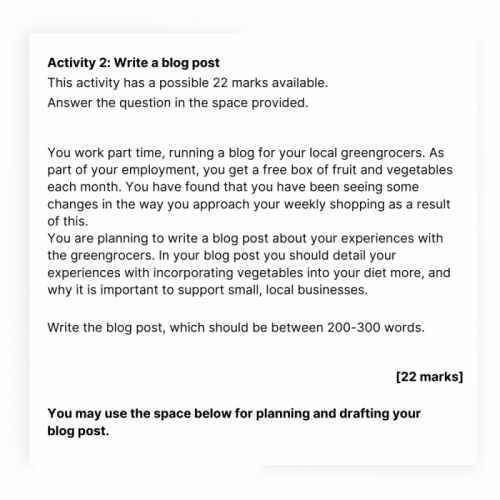
Start your AQA Functional Skills English Level 2 Writing practice now by clicking on the following link:
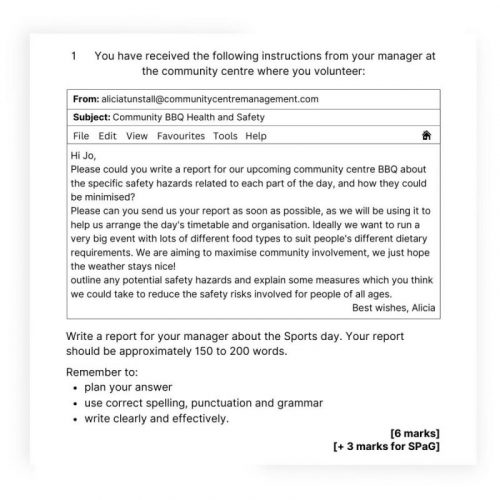
Start your Edexcel Functional Skills English Level 2 Writing practice now by clicking on the following link:
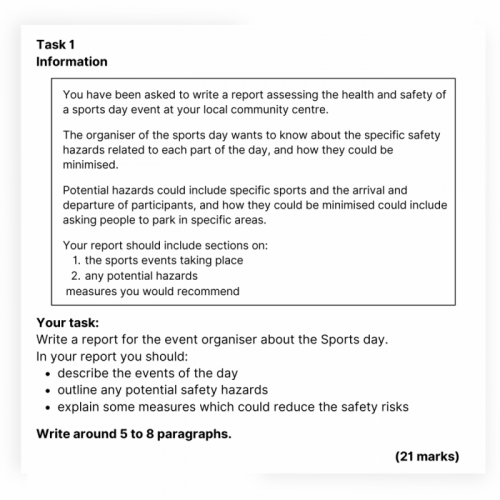
Start your City and Guilds Functional Skills English Level 2 Writing practice now by clicking on the following link:
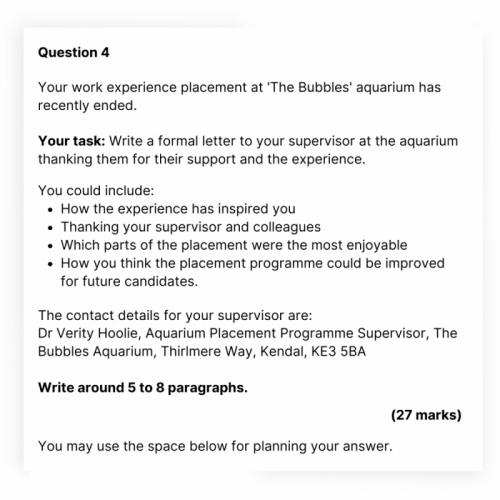
Start your Open Awards Functional Skills English Level 2 Writing practice now by clicking on the following link:
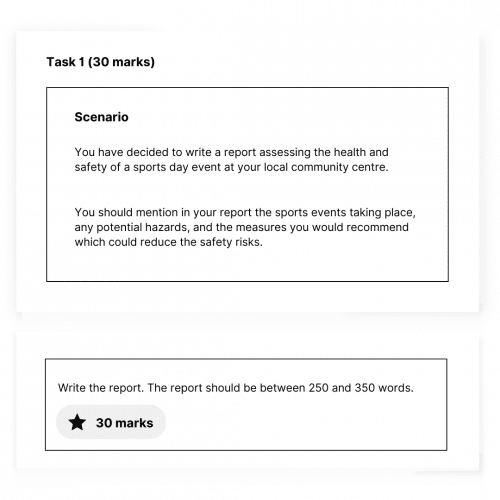
Where do I begin?
When first approaching your Functional Skills English Level 2 exam, it is easy to feel overwhelmed by the amount of information you need to learn.


However, here at Pass Functional Skills we have teams of experts dedicated to helping you pass each component.
Be it Functional Skills Level 2 Reading, Functional Skills Level 2 Writing, or your Speaking, Listening, and Communication Exam, we have what you need!
The writing section of your Functional Skills English Level 2 Exam requires a different skill set to the reading section.
Rather than analysing someone else’s text, you must craft your own, using the guidelines provided in each question.
The type of text you must write will vary from exam board to exam board, but the skills tested in each are the same.
You know where you want to end up: passing your Functional Skills English Level 2 Exam.
The question is, how do you get there, and where are you now, at the beginning of your learning journey?
Let’s take a look…
Where am I now?
We know that determining the areas of the exam you struggle with, and lose important marks in, is absolutely key.


To help you with this, and to reach your end goal of passing your exam, we created the Functional Skills English Level 2 subject knowledge assessment, to figure out your unique strengths and weaknesses.
To access to the subject knowledge assessment, go to our website’s dedicated page, linked here, or sign up for our online course.
The assessment contains specially selected questions modelled on the exams themselves, and chosen from our comprehensive topic list. This ensures that key subject areas are targeted, and you receive the most accurate skills assessment possible.
By completing the subject knowledge assessment you will take the next step along the path to English Functional Skills exam success, and make the most of the valuable time you have to spend on revision.
Once you have completed our subject knowledge assessment test, you can take the data compiled specifically for you, and apply it to the rest of your learning process. This will help you to not only pass, but to succeed in your exam.
How can I improve?


Whilst the skills needed for the reading paper can be practiced by reading and analysing texts, (for example Edexcel, City and Guilds or AQA), the same is not necessarily true for the writing task.
Rather than looking at questions or sources as with your Reading Exam, your Writing Exam will be easier if you are familiar with the format. For this, past papers are invaluable. This is because they provide you with an idea of the scenarios and information you will be given in the exam.
The writing section of the English exam for Functional Skills Level 2 is where you will use all the skills from the Reading Exam. Whilst you were previously analysing and breaking down texts, you are now building one yourself.
This is a separate and specific skillset. Looking at past papers is an invaluable way to familiarise yourself with what you will be faced with in the exam. The topics and exam sources which your Reading Exam paper are focused on will not necessarily be relevant to the final task, but it can be helpful to complete reading past papers. This is because looking at how other authors have structured their texts, makes you more familiar with the structure and style of text types.
To find the correct past papers for your exam board, follow the links below:
Edexcel City and Guilds AQA Highfield NCFE Open Awards
Top Tip Time
Although it can be tempting, remember that you shouldn’t focus only on the topics you feel the most comfortable with.
Practice makes perfect, so keep doing lots of practice exams online and physical papers to perfect the topics you find difficult.
This will benefit you much more in the exam than only practising areas you are already confident in!


On different areas of our website, you will be able to find an online version of our exam guidebook, which includes handy tips and tricks, to help you to ace your exam.
Functional Skills English Exam Guide Booklet
This guidebooks contain all of the basic information you need to successfully complete your exam. It contains a specific section for each component of your Level 2 English Functional Skills qualification. This includes examples of questions from the Reading and Writing components, and explaining what each component requires.
The task itself…
Whilst you will always be tested on your writing skills, this will always be done in one of several ways.
You will be asked to write a functional text, which in this case means a text with a specific purpose:
- to inform
- to persuade
- to argue
- to describe.
Understanding how to write a report, a letter, an article, or any other text is essential to being confident in the Functional Skills English Level 2 exam, as these will be the main text types you will need to write.
In the Functional Skills English Level 2 course and the revision pages created by our team, you can learn about presentational features, writing style, tone and language features. You will also learn why they are important to use when creating your own versions of these texts.


You should consider all of these elements when you are writing your text in your writing exam. You will be asked to produce two texts, each with a different purpose, and with different contexts and audiences for you to keep in mind.
Remember the key rules, that formal texts such as persuasive or informative letters and emails generally use fewer language features than informal texts.
Informal texts can also persuade, but they rarely inform. Instead, they are usually designed to get a specific reaction from the reader, and therefore don’t often contain information alone. Instead, they usually describe, discuss, or argue.
Watch out for these different textual requirements in your exam, and head to our guide book to find out more.
What’s next?
There are many things you can do in your daily life to improve your ability to select the correct presentational features, language features, style, and tone for texts.
These can include reading newspaper articles, emails, online blogs, and, finally books. Immersing yourself in reading is the best way to become comfortable with the formatting of specific text types.
Strengthening your understanding of what is appropriate for varied contexts and audiences is made easier by doing this.
In this way, you can prepare yourself as much as possible for your upcoming exam.


You can also find explanations of what is required for each of the text types you may be asked to produce on the following topic pages…
Additional pages on individual topics which are covered in more detail are the following…